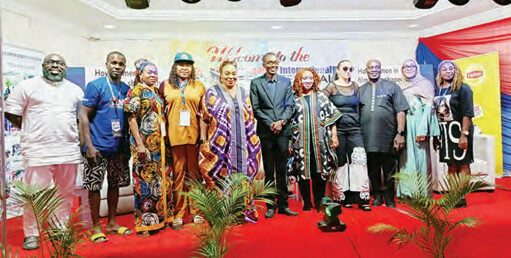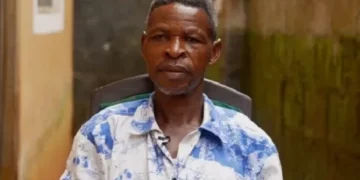Nigeria has ended Uganda’s two-year winning streak by sweeping 10 of the 16 awards at the 2025 edition of the Kaduna International Film Festival (KADIFF).
Nigeria won Best Actor (Kelechi Udegbe in ‘Offshoot’), Best Actress (Maryam Booth in ‘Taqdeer’), Best Supporting Actor (Ado Ahmad Gidan Dabino in ‘Kakanda’), Best Supporting Actress (Farida Adamu in ‘Kakanda’), Best Cinematography (Juliet Ibrahim’s ‘Healing The Inner Child’), Best Director (Steve Ayeny ‘Offshoot’), Best Feature Film (Reuben Reng and Abdulrasheed Bello’s ‘Taqdeer ‘Divine Decree’), Best Music Score (‘Kisum’ by John Njamah), Best Series (Seven Doors), and Best Editing (Kakanda).
Nigeria further cleaned up all the awards categories at the newly introduced KADIFF MTN Viewers Choice from Best Film (Offshoot) to Best Actor (Sadiq Ahmad in Kakanda), Best Actress (Amina A. Shehu, Kakanda), Best Indigenous Language Film (Zaharadeen Kwangila’s ‘Coloured Marriage’) and Best Short Film (‘Bottled Up’ by Tolulope Damilola).
While Uganda may have picked up fewer awards this year, the country must be commended for the categories it won, which are the most innovative parts of filmmaking, and Nigerian filmmakers are not quite strong in these areas.
These include Best Animation (‘Kintu’ by Denis Dhikusooka), Best Experimental Film (‘The Real General’), Best Documentary (Ssekandi Jimmy’s ‘The Shadow of the Pandemic’). It also won the Best Short Film (‘Half Chocolate Half Vanilla’ by Nodryn Evanci Kabuye), Best Student Film (Brian Adrine Kabogozza’s ‘Dinner for Three’) and Best Indigenous Film (Ronald Kyomuhendo’s ‘Mysteries of Love’).
Although there persists a low participation by northern Nigerians at the festival, both in attendance and in film entries, this year is considered the best outing of KADIFF since its founding in 2018.
The organisers attribute the lower participation to the lack of comprehension of the role of film festivals in the growth of the film Industry, said KADIFF founder and director, Israel Kashim Audu.
According to Audu, the festival’s objective is to create opportunities and platforms first for northern creatives, then Africans and the world.
While the festival has garnered national and global recognition, with over 2,000 film submissions this year from 50 countries (with the most entries from Uganda), and screened 168 films throughout its duration, it is yet to achieve its goal for northern creatives and the northern film industry.
“The only thing which has been lacking, and which we are working towards, is to ensure that we have core practitioners from the north to participate. The festival is held in Kaduna, and we don’t have northern film practitioners in attendance. That shows there is something wrong somewhere. We should see the North film stars, of whom we have so many, in attendance. But a few of them understand the importance of film festivals. That has been the challenge over the years.
“Currently, the last two editions have shown more northern creatives participating. While the number is not encouraging, I am sure that it will gradually get to the point where the practitioners get to own the festival and participate.”
Regardless of the low participation from northern film stakeholders, KADIFF has made an enormous impact in the northern film landscape. It has trail-blazed, since its inception in 2018, the opening of other northern film festivals such as the Kano Indigenous Film Festival (KILAF), Kano International Film Festival, Kwara Film Festival, Lafia Documentary Film Festival and the upcoming Arewa International Film Festival in Kaduna.
Moreover, the festival recorded the largest number of northern creative participants this year, with students of film and multimedia from Kaduna State University, Kaduna Polytechnic and Nuhu Bamalli Polytechnic, Zaria, in attendance.
This is not solely a way of catching film practitioners early but also of emphasising how participating in international film festivals can grow their careers and promote quality movies.
For some of the students, such as Hauwa, whom this is their first time participating in any
The festival was an eye-opener.
“The masterclass by veteran actor Francis Duru is so educative. As a first timer, I didn’t know the event would be this interesting. I am glad I came.
I have learnt that perfecting my craft be it acting or directing, knowing my script inside out, is what sets me apart from others, and how I become valuable in the industry.
A lecturer in the Film and Multimedia Department, Nuhu Bamalli Polytechnic, Musa Haruna, said attending the festival helps the students to meet and learn the art and process of acting from veteran actors.
“I think this festival will be an annual event for our students. We learn better when we get a real-life experience of anything, and film requires this practical experience.”
Commending the vision and perseverance of the festival organisers, Kaduna State deputy
governor, Dr Hadiza Sabuwa Balarabe, reiterated the state’s commitment to supporting the creative sector as part of its broader strategy of empowering its youth.
‘We recognise the creative industry as a vital driver of growth. Our young people have the energy, time and talent. What they need are platforms, such as this festival, to showcase their skills and connect with the broader market.
“I call on sponsors, partners and well-meaning individuals to support this festival. By investing in the festival, we are not only promoting arts and culture, but also strengthening an industry that has the potential to generate businesses and jobs for Nigerians,” he said.
Themed ‘Film For Social Change’ KADIFF 2025, held August 26 to 30.






